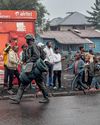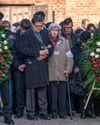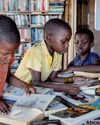
ON THE MORNING of 7 October, Neama al-Barawi got up early to prepare her children for school and make bread.
At 6.29am, the 36-year-old heard the howl of rockets being launched towards Israel from close to her home in Beit Lahia, one of the northernmost communities of Gaza.
Soon rumours began to spread that Hamas, the militant Islamist organisation that had ruled Gaza for almost all al-Barawi's adult life, had broken through the perimeter fence built around the territory by Israel. Scared, she decided to keep her five children at home.
Next door, Youssef al-Barawi, her nephew, was getting ready for a day at Beit Lahia's university, where he studied medicine, when he heard the rockets.
"That was the moment our whole life changed. Even now, we still do not know if we are dreaming or reality, because what is happening to us is beyond imagination," the 22-year-old said.
A year later, more than 41,500 of those in Gaza who were alive on that warm autumn morning are dead, according to the local health authorities. Most were civilians, and the total represents nearly one in every 55 prewar residents. More than three-quarters have been fully identified. Ten thousand may be buried in rubble, experts believe.
When Neama al-Barawi finished baking, she gathered her children around her and scrolled through news on her phone. An hour or so later, she heard whistles and cheers outside in the street as a car driven from Israel by militants drove past her home.
Only later would she learn what Hamas had wrought: the murder in Israel of 1,200 people, mostly civilians, in their homes or at a music festival, and the abduction of 250 more. But Neama was already certain that Israel's retribution would be terrible, so she started gathering important documents and clothes. When, that evening, the house of the militant she had seen driving the Israeli car was destroyed in an airstrike, her fears for the future mounted.
This story is from the October 11, 2024 edition of The Guardian Weekly.
Start your 7-day Magzter GOLD free trial to access thousands of curated premium stories, and 9,000+ magazines and newspapers.
Already a subscriber ? Sign In
This story is from the October 11, 2024 edition of The Guardian Weekly.
Start your 7-day Magzter GOLD free trial to access thousands of curated premium stories, and 9,000+ magazines and newspapers.
Already a subscriber? Sign In

What is DEI and why is Trump waging war against it?
When American voters headed to the ballot box in November, opinion polls suggested the cost of living, immigration and reproductive rights ranked among their biggest concerns.

Who are M23 rebels and why is there fighting in eastern DRC?
The armed group M23 and Rwandan soldiers entered the centre of Goma last Sunday after weeks of advancing on the main city in the Democratic Republic of the Congo's North Kivu province.

Aid distribution What Israel's ban on Unrwa may mean for Palestinians
Israel this week insisted it would not back down over its plan to close the Gaza operations of the United Nations Relief and Works Agency for Palestine Refugees (Unrwa), even though critics said the move would jeopardise urgent humanitarian aid efforts.

Anti-terror strategy failed to stop a killer
Southport attacker's lack of coherent ideology meant the Prevent scheme did not see him as a potential risk, exposing the need for reform
Last writes
Handwriting is disappearing - we are far more likely to use our hands to type or swipe than pick up a pen. But in the process are we in danger of losing cognitive skills, sensory experience and a connection to history?

I just want to hug those girls' Bittersweet joy and relief as freed soldiers return home
Nineteen-year-old Naama Levy became an indelible symbol of Hamas’s 7 October 2023 attack on Israel.

Eighty years after the liberation of Auschwitz, survivors call for courage amid the rise of hatred and antisemitism 'We must avoid the mistakes of the 1930s'
On a day of startling blue skies, Auschwitz survivors stood before princes and presidents on Monday to remind the world, perhaps for the final time, of the horrors they suffered there during one of the darkest moments of human history.

Davos lessons Trump's return heralds new era of harsh global competition
In the heady mountain air of Davos last week, away from the parties and the backslapping tech bros, another, more beleaguered crew touted their wares: the multilateralists.

Can the continent's publishing industry turn a page?
Tsitsi Dangarembga's Nervous Conditions, a novel about growing up in colonial Zimbabwe, is one of the most important works of 20th-century African literature and features on university curriculums across the UK.

Trump has arrived with abang-but can he follow through?
Little more than a week ago, Stewart Rhodes was serving an 18-year prison sentence for seditious conspiracy over his role in a deadly attack on the US Capitol.